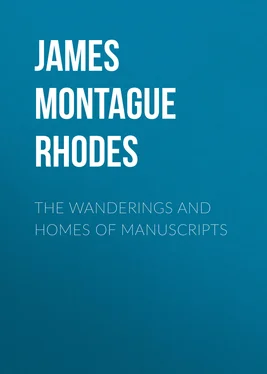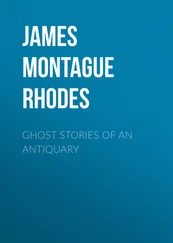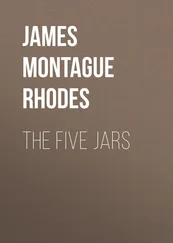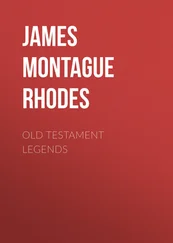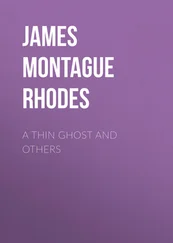Montague James - The Wanderings and Homes of Manuscripts
Здесь есть возможность читать онлайн «Montague James - The Wanderings and Homes of Manuscripts» — ознакомительный отрывок электронной книги совершенно бесплатно, а после прочтения отрывка купить полную версию. В некоторых случаях можно слушать аудио, скачать через торрент в формате fb2 и присутствует краткое содержание. Жанр: Биографии и Мемуары, Европейская старинная литература, foreign_antique, на английском языке. Описание произведения, (предисловие) а так же отзывы посетителей доступны на портале библиотеки ЛибКат.
- Название:The Wanderings and Homes of Manuscripts
- Автор:
- Жанр:
- Год:неизвестен
- ISBN:нет данных
- Рейтинг книги:3 / 5. Голосов: 1
-
Избранное:Добавить в избранное
- Отзывы:
-
Ваша оценка:
- 60
- 1
- 2
- 3
- 4
- 5
The Wanderings and Homes of Manuscripts: краткое содержание, описание и аннотация
Предлагаем к чтению аннотацию, описание, краткое содержание или предисловие (зависит от того, что написал сам автор книги «The Wanderings and Homes of Manuscripts»). Если вы не нашли необходимую информацию о книге — напишите в комментариях, мы постараемся отыскать её.
The Wanderings and Homes of Manuscripts — читать онлайн ознакомительный отрывок
Ниже представлен текст книги, разбитый по страницам. Система сохранения места последней прочитанной страницы, позволяет с удобством читать онлайн бесплатно книгу «The Wanderings and Homes of Manuscripts», без необходимости каждый раз заново искать на чём Вы остановились. Поставьте закладку, и сможете в любой момент перейти на страницу, на которой закончили чтение.
Интервал:
Закладка:
Speaking broadly, then, of the destinies of Greek MSS., I may repeat that they were produced in a comparatively small area, that a great many of the most precious ones were concentrated in one place, and that from the fourteenth century onwards they became objects of desire to the great ones of the earth, who vied with each other in sending special emissaries to collect them. As a result, the greatest treasures were soon locked up in the libraries of princes and prelates, and became less commonly exposed to dispersion and sale than Latin books. We must remember, too, that as a rule the monasteries of Western Europe did not collect Greek MSS.; they possessed a chance one here and there, as we have seen, but rather as curiosities than as books to be used. 1 1 Let not the 400 MSS. given by Coislin to the Abbey of St. Germain des Prés at Paris be quoted against me. They were the collection of a great noble, the Chancellor Séguier, and the library to which they were presented was practically a public one, whose permanence was seemingly assured.
To the noble and the scholar there was a flavour of distinction about a Greek MS. which was wanting to all but the most venerable and beautiful of the Latin ones.
There is still much to be done in the investigation of the history and relationships of Greek MSS. In spite of the numberless editions of the great authors, and the labour that has been lavished upon them, I believe that scholars would agree that in very few cases, if any, is the transmission of the text at all perfectly known. For some writings we have too little MS. evidence, for some so much as to be embarrassing. In no case can we afford to neglect and to leave unrecorded anything that a MS. can tell us as to its place of origin, its scribe, or its owners. Names and scribblings on fly-leaves, which to one student suggest nothing, may combine in the memory of another into a coherent piece of history, and show him the home of the book at a particular date, and by consequence unveil a whole section of the story of its wanderings. With one little instance of this kind I will bring to an end my remarks on this first and shorter portion of my subject. In the library of Corpus Christi College at Cambridge is a Greek Psalter written in the middle of the twelfth century. On one of its last pages is scribbled in Greek letters by a later hand the name of John Farley ("Ἱωἁννης φαρλεἱ"). Only about five-and-twenty volumes away from this stands a MS. containing letters written by the University of Oxford on public occasions. One of these is signed by J. Farley. A little enquiry elicits the fact that John Farley was official scribe of that University near the end of the fifteenth century. The Greek Psalter, then, was pretty certainly at Oxford in Farley's time. What do we know of Greek MSS. then at Oxford? We know that Bishop Robert Grosseteste of Lincoln owned such things, and that he bequeathed his books to the Franciscans of Oxford at his death in 1254; and when we examine the Psalter again, we find that it is full of notes in a hand which occurs in other Greek MSS. known to have belonged to Grosseteste, and which I take to be Grosseteste's autograph. So the mere occurrence of John Farley's name helps us to write the history of the book from within a hundred years of its making until the present day. Procured by Grosseteste some time before 1254, it passes to Oxford, and remains there till the Grey Friar's Convent is dissolved by Henry VIII. Then there is a gap of a generation at most. Matthew Parker, Archbishop of Canterbury, acquires it (believing it, absurdly enough, to have belonged to Archbishop Theodore in the seventh century), and bequeaths it to his college of Corpus Christi in 1574.
We turn to the Latin division, and here the difficulty of selecting lines of procedure is very great. A paragraph of historical preface, at any rate, must be attempted.
At the period of the Barbarian invasions—the fifth century—the learned countries were Italy, France (especially Southern France) and Spain. Of these three, Italy may be described as stationary or even decadent, but she possessed greater accumulations of books than either of the other two. The result of the invasions was, no doubt, that libraries were destroyed and education dislocated; but there was another result, as we have lately begun to realize—namely, that in the case of France there was a transplanting of culture to another soil. A number of teachers fled the country, and some at least came to Ireland. This, as far as we can now see, was the beginning of that Irish learning which has been so widely, yet so vaguely, extolled. Ireland, then, in the late fifth century and the sixth, holds the lamp. Its light passes to England in the middle of the seventh century, and from thence, near the end of the eighth, to the Court of Charlemagne, where it initiates the Carolingian Renaissance. In the ninth century, when England is a prey to the Danes, the Carolingian Court and the great abbeys of Germany are enjoying a vigorous intellectual life, stimulated and enriched by scholars from Italy and from Ireland. In a general view the tenth and eleventh centuries must figure as a period of degeneration; the twelfth as one of immense intellectual and artistic vigour, culminating in the thirteenth. In the fourteenth the foundations of what we call the Renaissance are already being laid, and we have hardly passed the middle of the fifteenth before the MS. has received its death-blow in the publication of the first printed Bible.
Конец ознакомительного фрагмента.
Текст предоставлен ООО «ЛитРес».
Прочитайте эту книгу целиком, купив полную легальную версию на ЛитРес.
Безопасно оплатить книгу можно банковской картой Visa, MasterCard, Maestro, со счета мобильного телефона, с платежного терминала, в салоне МТС или Связной, через PayPal, WebMoney, Яндекс.Деньги, QIWI Кошелек, бонусными картами или другим удобным Вам способом.
1
Let not the 400 MSS. given by Coislin to the Abbey of St. Germain des Prés at Paris be quoted against me. They were the collection of a great noble, the Chancellor Séguier, and the library to which they were presented was practically a public one, whose permanence was seemingly assured.
Интервал:
Закладка:
Похожие книги на «The Wanderings and Homes of Manuscripts»
Представляем Вашему вниманию похожие книги на «The Wanderings and Homes of Manuscripts» списком для выбора. Мы отобрали схожую по названию и смыслу литературу в надежде предоставить читателям больше вариантов отыскать новые, интересные, ещё непрочитанные произведения.
Обсуждение, отзывы о книге «The Wanderings and Homes of Manuscripts» и просто собственные мнения читателей. Оставьте ваши комментарии, напишите, что Вы думаете о произведении, его смысле или главных героях. Укажите что конкретно понравилось, а что нет, и почему Вы так считаете.
